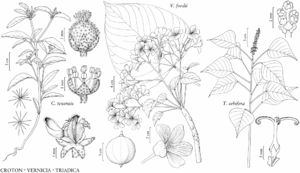Triadica sebifera
Florida Trees, 59. 1913.
Trees, to 13 m (fertile from 1 m). Leaves: stipules persistent, elliptic, 0.7–1 × 0.5–0.7 mm; petiole 2–7 cm, glands 2, discoid, adaxial; blade ovate to broadly elliptic or rhomboid, 3.5–10 × 3–9.5 cm, base broadly cuneate to nearly truncate, apex acuminate; laminar glands 0–10, elliptic, 0.3 × 0.2 mm, usually on distal 1/2 of leaf. Inflorescences to 20 cm; staminate cymules numerous, 10–20 flowered, bracts ovate, 1.5 mm, subtended by 2 [–4] ellipsoid glands; pistillate flowers 0–6 per inflorescence, 1 per bract (often in bisexual cymules with 0–5 staminate flowers), bracts of basal flowers usually not subtended by ellipsoid glands. Pedicels: staminate 1.5–3 mm; pistillate 1–2 mm, to 12 mm in fruit. Staminate flowers yellow; sepals 0.5–1 mm, shallowly 3-lobed, margins erose; filaments to 0.2–0.3 mm; anthers 0.5 mm. Pistillate flowers yellowish green; sepals 2–3 × 1 mm, apex acuminate; styles 4–8 mm, coiled distally. Capsules 1–1.3 cm diam., subglobose, trigonous; columella 1 cm. Seeds 6–9 × 4–7 mm, usually remaining attached to columella; outer seed-coat white, waxy; inner coat woody, brown, smooth. 2n = 88.
Phenology: Flowering Apr–Jun; fruiting Aug–Nov.
Habitat: Low swampy places to uplands.
Elevation: 0–200 m.
Distribution
Introduced; Ala., Ark., Calif., Fla., Ga., La., Miss., N.C., S.C., Tex., e Asia (s China), e Asia (Taiwan), e Asia (Vietnam)
Discussion
Triadica sebifera is economically important in Asia for the waxes and oils in its sarcotesta and seeds and as a source of dye and timber. The species is cultivated in the United States mainly as an ornamental, with introductions dating to the late 1700s; it readily becomes naturalized and is a stand-replacing invasive of native forests, riparian areas, and prairies. The range of T. sebifera is predicted to continue expanding from the Sacramento River delta region in California, and also north and west from southeastern United States coastal regions, until it reaches limits for drought, salinity, and cold tolerance (R. Pattison and R. Mack 2007). An isolated population in Kentucky was extirpated to prevent naturalization (E. Comley 2008).
Selected References
None.
Lower Taxa
"/2" is not declared as a valid unit of measurement for this property. "/3" is not declared as a valid unit of measurement for this property.
